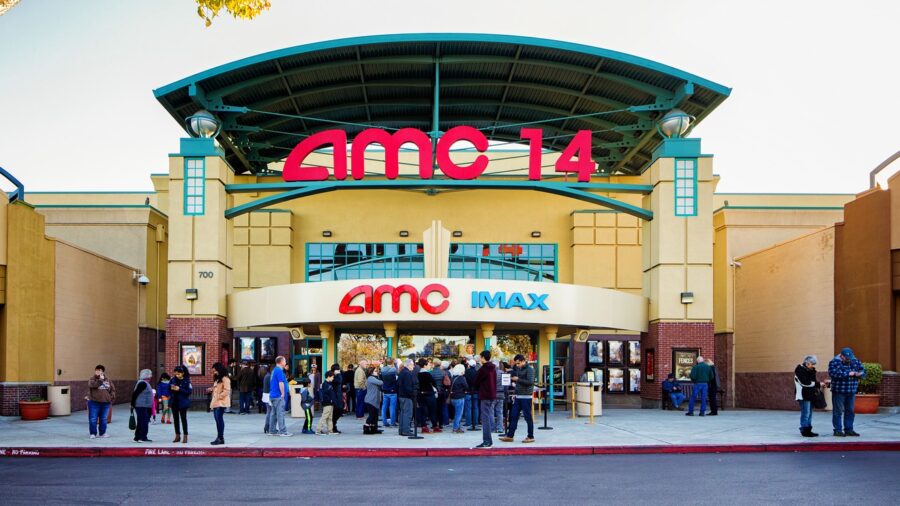An Essential Evil
AMC’s reopening reflects the sentiments of companies nationwide: we don’t care about our minimum wage workers
Coinciding with its centennial anniversary, AMC announced its plans to reopen theaters on August 20 in an email sent to customers. With enticing offers like 15-cent tickets on opening day and $5 tickets to time-honored classics and previously-released films like “Ghostbusters,” “Jumanji,” “Black Panther,” and “Back to the Future,” the word’s largest movie theater chain is playing quite the siren’s song to get you back into their reclining seats. One thing is noticeably missing from their media blast, however, is how they will be supporting their employees during this difficult and stressful time. It is something that is rarely mentioned in revamped store policies, but a burden that is felt across all minimum wage workers. AMC’s announcement seems to follow the pattern of corporations hedging their bets and putting an unnecessary and inhumane strain on their minimum wage workers, along with risking their lives during an unprecedented worldwide pandemic. It’s another grim instance of companies treating their employees as if they were expendable.
Nowhere in the email or on their AMC Safe and Clean TM website does it mention additional training or benefits provided for their employees. Although they have reversed their controversial optional mask policy after a heavy backlash, and now tout updated World Health Organization guidelines in their mask policy, they will be relying on that same staff to enforce these rules amongst the rest of their additional duties. Typical de-escalation tactics work less and less as the realities of the pandemic weigh heavier and heavier on the American public. Current essential workers are already fearful of mask enforcement confrontations, and frankly, we shouldn’t be wholly relying on this already overwhelmed workforce to enforce state or county mandates, anyway.
The website also promotes social distancing complete with signs and reminders for customers and employees alike, but as anyone who has been to any sort of market recently knows, social distancing enforcement is pretty much nonexistent. Businesses can plaster stickers all over their floors, and post signs all over their walls, but they will never be able to make a customer read. Grocery store workers have already said that 85% of customers do not practice social distancing. Even stores like Ross Dress for Less, who have dedicated one-way shopping aisles, have little to no actual enforcement or compliance of social distancing regulations outside of people standing 6 feet apart in line upon checkout. Social distancing at the movie theater only seems feasible for customers while they are seated during screenings, but nearly impossible anywhere else or for anyone else. Movie theater employees will join the ranks of other minimum-wage part-time employees who are constantly within 6 feet of either each other or customers, both increasing their chances of contracting the virus and lessening the safety of the establishment. A real catch-22 for people who don’t care about either their employees or customers but know they need both to make more money.
Food and drink are continued to be allowed in the auditorium, and masks are still required but “may be removed while enjoying food or drinks.” They also throw in an ambiguous “Protect yourself and others while wearing a mask before, after, and during your movie,” but no real specifications on who is enforcing these rules. By comparison, Regal Theaters, scheduled to reopen Aug. 21, are more straightforward, with stricter mask enforcement than AMC. They boast continued monitoring of screenings for “socially unacceptable behavior,” which includes mask usage in auditoriums when not eating or drinking, Regal plans to operate at 50 percent capacity, perhaps due to only seven of their theaters providing dine-in service. AMC plans to operate at 30 percent capacity and touts new air filters while Regal plans to increase their fresh air intake to improve air circulation, but it is unclear how these methods combat the potential hazards and inevitable close contact that indoor dining presents. With restaurants and bars proving to be hotbeds for COVID infections, and indoor dining remaining controversial at best, you would think they could’ve done without the popcorn.
It’s well and good to have these rules and policies in place but it doesn’t mean anything if it’s not enforced. Customer service-based industries have rendered themselves virtually toothless when it comes to enforcing policies on customers. Anyone who has worked in customer service knows the customer just has to kick up a big enough tantrum for a long enough time to either get exactly what they want or some form of what they want. Stores will disregard their own return policies, placate customers with coupons or gift cards, and generally side with the customer. Because the customer is always right, of course, even if they’re wrong. This golden rule has taken a darker meaning when it comes to customer service during the pandemic. Regardless of policy, employees across the nation have been instructed not to force someone who refuses their mask policy nor to bar them entry to the establishment. Essential prevention procedures set in place to maintain public health and safety are reduced to heavily underlined suggestions, optional to those who see fit and enforced on a day to day basis by the minimum wage workforce.
AMC’s workforce in particular is largely compromised of younger people, which is unsurprising because working at a movie theater is one of the last jobs a teenager can have. The chain employs teenagers as young as 14 years old, state labor laws and schoolwork permitting. Their employees earn minimum wage and work part-time if not in management or supervising positions. Customer service during COVID has proven to be a grueling, Sisepheyan task that gets worse the longer it goes on with little to no continued benefits provided to those putting their health at risk. It’s an awful lot of risk for very little reward, and a story echoed throughout our nation as businesses struggle to adapt to the realities of the pandemic.
This isn’t a matter of some customer making a scene to get a free hotdog. This is the unfair practice of depending on minimum wage workers as the first line of defense against people who already refuse to listen to medical and scientific professionals alike. This is the ugly reality of asking some teenager to hold grown adults accountable without substantial support from their employer. The unfortunate consequence of constantly rewarding bad behavior. This is how you make a bad thing worse.











